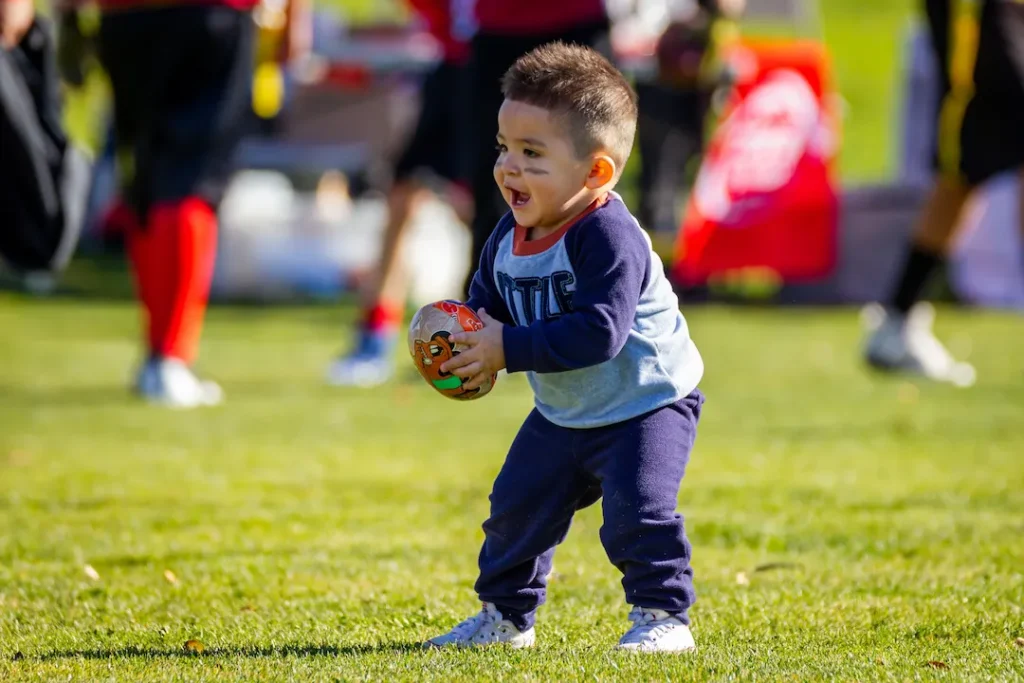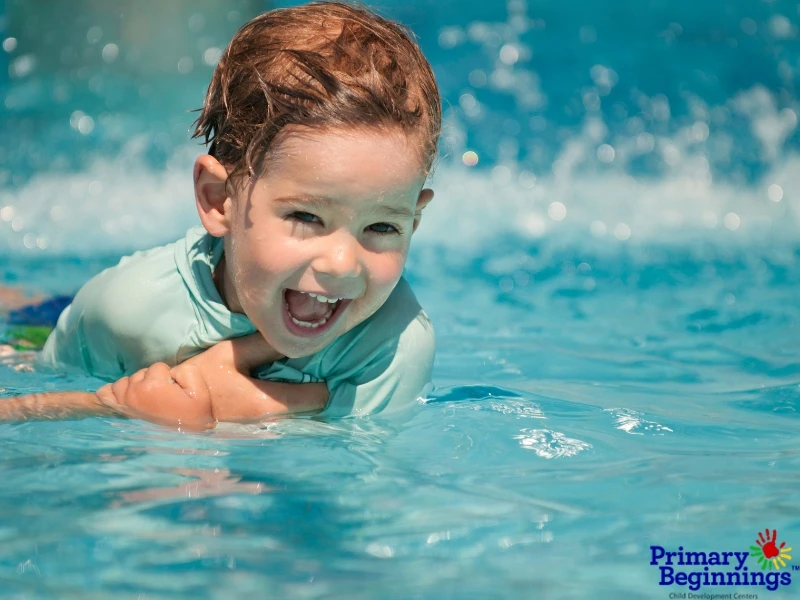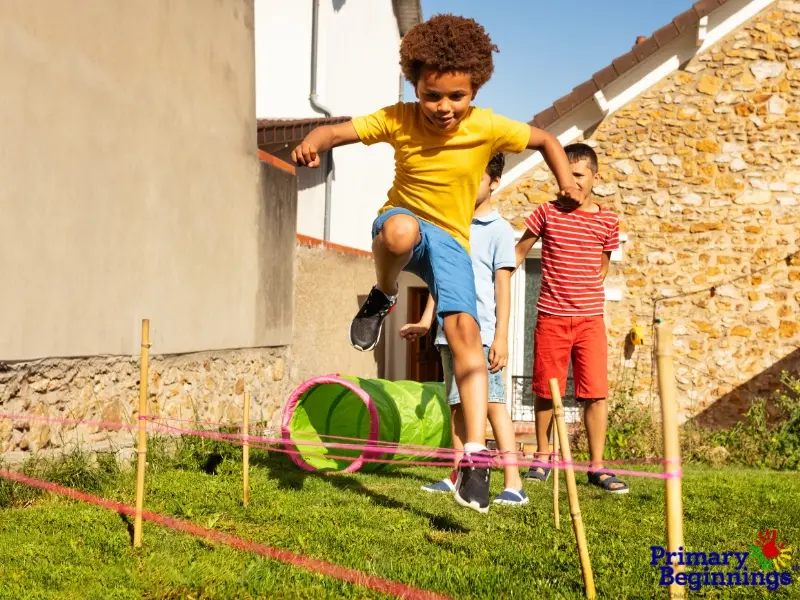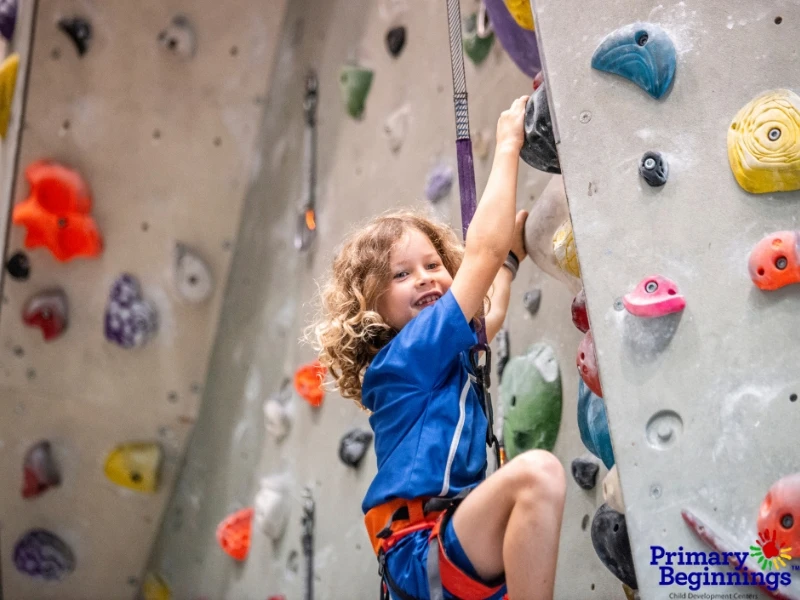The fall can be a fun time for toddlers. With the weather cooling down, and…
Parents often wonder when is the right time to introduce kids to sports. While it depends on the sport, preschoolers can start enjoying sports with age-appropriate activities that focus on building coordination and social skills. At ages three and four, some organized sports with complex rules may be too challenging for preschoolers, but simpler versions adapted for young children can be both fun and beneficial.
Early childhood sports promote physical and mental growth and can set the foundation for future sports involvement. Join our team of educators and caretakers at Primary Beginnings, a 5-star Raleigh preschool, as we explore the best sports for toddlers and how they support child development.
Table of Contents
Benefits of Playing Sports with Young Children
Physical development and sports activities for 3 year olds offer a wealth of great benefits for their overall development. While they may not yet be ready for organized sports, incorporating playful activities with sports themes can have a huge impact on their physical, emotional, and social growth.
Traditional Sports for Preschoolers
Introducing traditional sports to preschoolers can be a fun way to develop motor skills, coordination, and social interaction. While preschoolers may not be ready for the complexities of organized sports, they can still enjoy simplified versions that help teach kids foundational skills.

Catch
Playing catch is a great way to improve hand-eye coordination and teamwork. For toddlers and preschoolers, you can start with a soft, lightweight ball and encourage them to throw and catch with a partner. Keep the distance short and focus on gentle throws to help them build confidence and muscle memory. As they improve, you can gradually increase the distance or introduce fun variations, like catching the ball while jumping or spinning.
T-Ball
Tee ball is a wonderful sport for preschoolers as it introduces them to the basics of playing baseball, such as hitting, running, and catching. Instead of using a pitched ball, children can hit a stationary ball placed on a tee, which makes it easier for them to connect with. To keep it engaging, set up simple bases and encourage them to run around them after hitting.

Basketball
Basketball learning for preschoolers focuses on basic skills like dribbling, shooting, and passing. Use a lower hoop or even a homemade hoop on a wall or tree to make it easier for them to score. For younger children, simply dribbling the ball or passing it to a partner can be a fun challenge.
Keep the games short and light-hearted, using soft balls to ensure safety, and encourage them to practice playing basketball from different distances to gradually improve their coordination.
Soccer
Soccer is excellent for teaching balance, coordination, and teamwork. For preschoolers, make the game less about rules and more about kicking the soccer ball to a target or a teammate. Set up small goals using cones or markers, and let them practice dribbling or simply kicking the ball around to build their foot-eye coordination.
Keep the games short to match their attention spans, and offer plenty of praise for every successful kick or pass to keep them motivated.
Swimming
Swimming is a fun way for preschoolers to develop strength and coordination, especially with water play that doesn’t necessarily involve formal strokes. Begin with simple splash games or floating activities, allowing them to get comfortable in the water. Use floating devices like kick boards to help them build confidence and gradually introduce movements like kicking and paddling.
Focus on making it playful and safe, with plenty of opportunities for splashing and playing with toys in the pool.

Movement-Based Preschool Sports
Movement-based sports are perfect for preschoolers, as they focus on physical activity, coordination, and team-building in a fun and playful way. These activities are designed to help young children develop essential motor skills while encouraging them to be active and engage with others.
Dancing
Dancing is an excellent way to encourage creativity and physical activity in young children. Preschoolers can enjoy dancing to music by mimicking simple movements or creating their own dances. To engage them, play fun, upbeat music appropriate for their age group, and have them follow along with simple instructions, like spinning or jumping.
You can also introduce dance games, like "freeze dance," where they stop moving when the music stops, helping to develop listening skills and coordination in a playful environment.
Relay Race

Relay races are a great way to introduce preschoolers to teamwork and running. Set up a simple course where children can take turns running from one point to another, either solo or in teams. To keep things engaging, add fun twists like hopping, skipping, or crawling instead of just running.
Relay races help preschoolers practice following directions, working with others, and building their stamina, all while having fun.
Tug of War
Tug of war teaches preschoolers about teamwork, strength, and balance in a playful and non-competitive way. Use a soft rope or even a towel, and have children work in pairs or small groups. Instead of pulling with all their might, encourage them to focus on working together by pulling at the same time.
This can be a great way to introduce basic teamwork concepts and build upper body strength in a fun, safe manner.
Obstacle Course
An obstacle course is perfect for preschoolers to practice balance, coordination, and problem-solving skills. Set up a simple course using items like pillows, cones, or tunnels for them to crawl under, jump over, or run around. Keep the challenges simple and short, and allow them to go through the course several times for extra practice.
Adjust the difficulty based on their abilities, making it a fun challenge without frustration.
Climbing

Climbing is an excellent way for preschoolers to develop strength, coordination, and confidence. You can use playground equipment, such as slides, ladders, or soft climbing structures, to create safe climbing challenges. Encourage kids to climb up or over obstacles while maintaining their balance and coordination.
Always supervise closely to ensure their safety, and celebrate their efforts to boost their confidence as they master new skills.
Help Get Your Child Interested in Sports
If you’re a parent or caretaker looking for ways to involve your child in sports activities, there's no better place to start than at Primary Beginnings. Our 5-star Raleigh preschool's early childhood education programs are designed to nurture both educational and physical development.
We encourage you to schedule a tour at one of our campuses in North Raleigh, where our educators and caregivers support your child’s mental and physical journey. Fill out the contact form below, or call us today at 919-790-6888 to get started.
